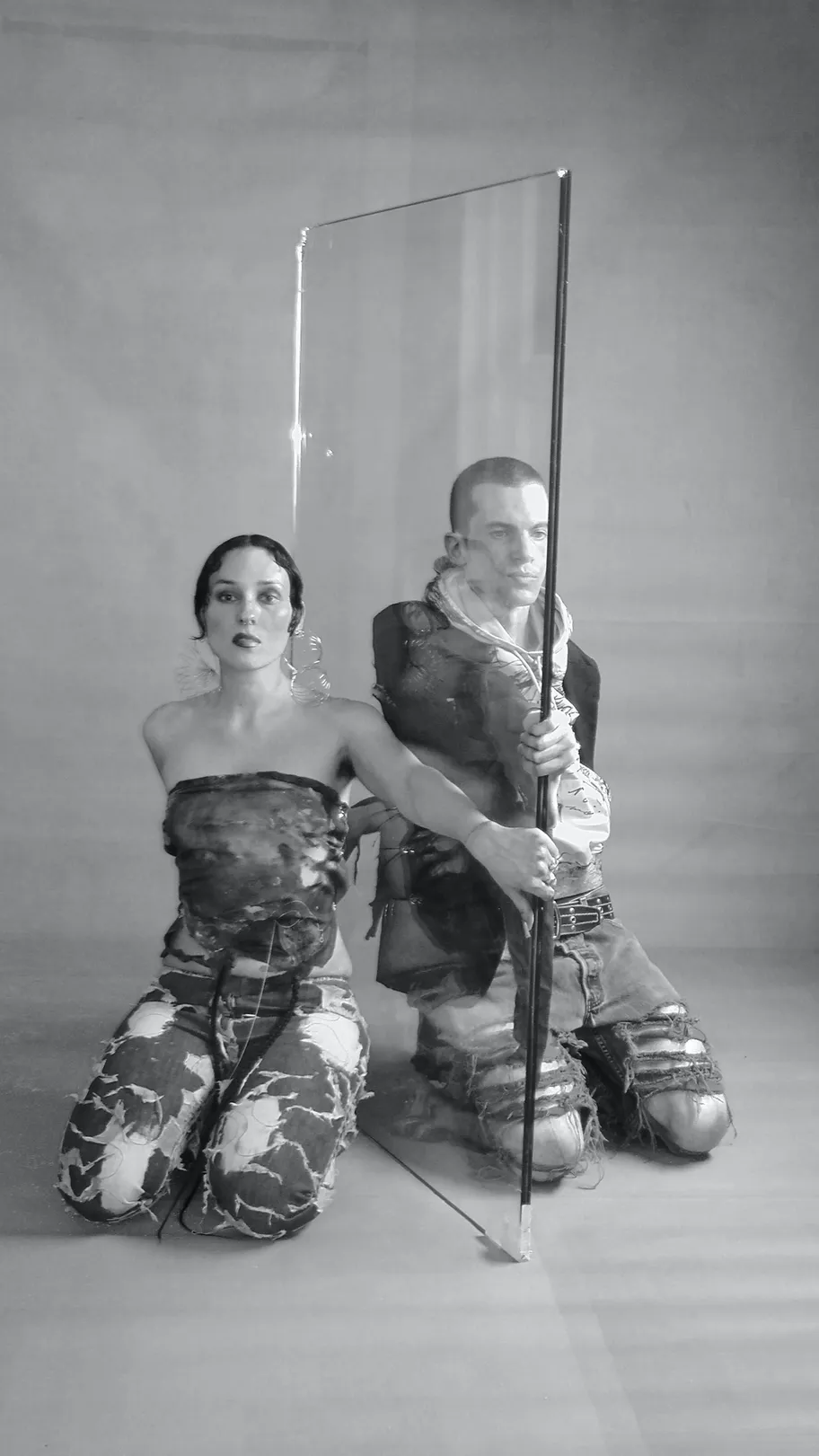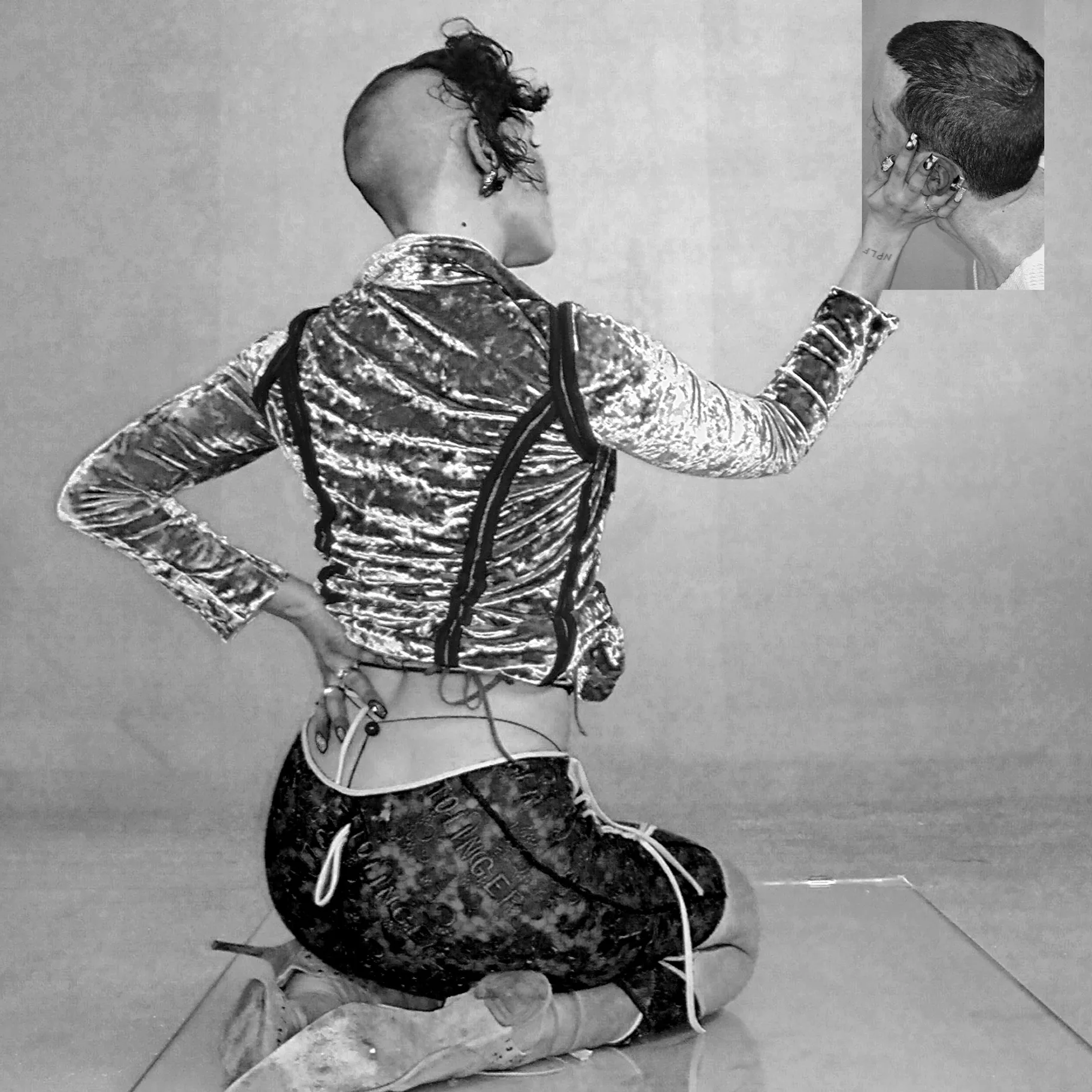Just before the world shut down in 2020, I caught a live set from Montreal rave-punk duo Pelada at The Paramount in Boyle Heights. I was already a fan of their debut album, Movimiento Para Cambio, but this experience elevated the music to an engrossing, visceral experience.
Mic in hand, commanding the stage, you’d swear that frontperson Chris Vargas is 12 feet tall. Spoiler: they’re not, but the gigantic and ferocious nature of their performance would make you swear otherwise. Meanwhile, Tobias Rochman’s beats landed maximal punches and incorporated new layers into the live setting — the perfect complement to Vargas’ fiery stage presence.
More than three years later, the show still resonates in my brain for its pure, unadulterated intensity, and it’s made me a fan for life.
Pelada’s new self-released sophomore album, Ahora Más Que Nunca, evolves their musical palette, building on the crisply abrasive beats of their first record with hip hop and punk rock added to the mix. The instrumentation and textures reveal Pelada to be a band in the midst of a sonic growth-spurt.
Your chance to see and hear it all up close and personal is imminent. Pelada hits LA on Friday, Nov. 3 to kick off Substance Festival 2023 at the Globe Theater.
Ahead of their LA trip, Vargas and Rochman lay down their own guest mixes for FREAKS ONLY, a greater-than-the-sum-of-its-parts pairing that showcases their individual strengths while also being totally complimentary. Vargas’ mix nods to their industrial roots with a flair for the theatrical and an interest in traversing stylistic territory that veers from Korea Town Acid to BAMBII. Rochman’s mix focuses more intently on hard beats and a relentless pace (cheeky ending aside). Immerse yourself in not one but two(!) mixes via the player icon at the top of the page — you’ll hear the Vargas mix fist, and the Rochman mix immediately after. Let’s get visceral. Plus, read on for our chat about Pelada’s genesis, their hometown of Montreal, and what went into making such an excellent new record.
The following interview has been edited and condensed for clarity.
Travis Holcombe: How did you two start making music together?
Tobias Rochman: Chris was in an industrial band called Pelvic Floor. I had just started doing solo projects and learning about synths — this was 10 or 11 years ago… something like that. We were both playing a show opening for Sewn Leather and Chris asked me if I wanted to meet up and make music.
Chris Vargas: We started getting together to write songs. Two of our friends started this festival here called Slut Island and hired us for that gig to do our first showcase. We decided that if it worked out that would keep going. It ended up being a good experience for us.
What does Pelada mean?
Vargas: I'm Colombian, my parents are from Colombia. When you refer to a young girl in Colombia, you call them a pelada. It's also the word that my parents used to call me as a kid, so it has a very personal meaning to it. Pelada also means naked, or when you're without something. And then in other countries, it has different meanings...
How did you come to the decision to sing the lyrics in Spanish for this project?
Vargas: I didn't get to learn Spanish in school, so when we started talking about this project and how we wanted it to sound — I proposed that we would do it in Spanish, so that it would give me the opportunity to develop that skill. It would have been easy for us to write songs in English or in French, but doing it in Spanish made it feel a bit more personal.

Photo by Hendrick Schneider
How long did it take to develop your working relationship, and figure out the direction you wanted the project to take?
Rochman: I think it was our first show. It went amazing. At the time, we didn't really know about MIDI or anything like that; we had a drum machine and some synths, but we didn't really know how people make electronic music. We scraped the set together and kind of just got encouraged by our friends and then by the crowd. It's a very loving, inclusive kind of crowd at Slut Island.
Vargas: The music scene in Montreal in general, because it's so small, I feel like people are really supportive.
Can you tell us a bit more about the Montreal scene?
Vargas: I feel like since the pandemic there's a lot more DJs. I feel like they weren't around for the rave scene in Montreal before. There aren’t as many producers or live performers as when we first started making music. But in terms of the spirit of the community, people are still coming out to shows, and people still have that communal energy.
Rochman: When we started, people like Bernardino Femminielli and Marie Davidson were our contemporaries and our peers in that scene. But yeah, like Chris said, DJ-ing is much more in style right now than original music. I think it comes in waves.
Before, there were a lot of warehouse spaces that you could get really cheap. On any given weekend, you would go out and there'd be like five electronic music like parties or raves from all different sides of the spectrum happening in a four or five block radius. If one party got busted, everybody would go to the other party. It was a really special time. The police budget has increased every year in Montreal, and they've cracked down on a lot of that stuff. But I feel like the myth still exists so people will still try to pursue it. The spirit can't be crushed, even if it's in a little bit of a lull compared to the peak of a few years ago.
Do you consider yourselves more closely aligned with the rave scene than the band scene in Montreal?
Rochman: Yeah, I would say so. I mean, we came up in the rave scene. Chris and I have punk backgrounds, so I think we learned about community building and those types of lessons that you learn from the punk scene when you're a teenager.
Vargas: In the early days, we would play a lot of bills with punk bands. We do less of that now mainly because we want to be sure to work with people who know how to mix electronic sound properly in a room. Oftentimes at these DIY punk venues, it's really just like… how low you can make the guitar or whatever. So we do less of that now, but every now and then it definitely happens. I think we're focusing more on festivals and clubs and our after parties outside of Montreal.

Ahora Más Que Nunca album cover - photo by Hendrick Schneider
What lessons from your first record were you able to apply while making your sophomore release, Ahora Más Que Nunca?
Vargas: A lot. The first album felt more like a tracklist [one song after another] that we wanted to put out there. But the second album has way more music theory and more melodies. Going into it, we wanted to make it sound and feel like a movie and a journey. It's more curated than the first one.
Rochman: It's hard to escape, but it's definitely our pandemic record. We made it at a time when we were under lockdown. We weren't at the club so a lot of it is a bit more introspective. Now that we're on the road again, we're reworking the material and changing it up in the live sets. The live set and the record are quite different.
Since we’ve started touring internationally, we're mostly on the festival circuit and we make our music a little bit more bombastic for festival crowds. We don't know how we got on to that circuit, but it's been a lot of fun. We just try to make it live music. The music is bolder and more ready for bigger crowds because we want to be able to hold our own.
What is your secret to capturing the raucous energy of your live set and bringing it to a studio setting when you’re recording?
Vargas: It's not the same, honestly. It's hard to mimic that because I feed off of what the audience is giving us. It's an exchange of energy and you don't have that in the studio. I feel like that's hard to do and you kind of have to pretend. I think the studio record is only one version of us. Then there's the other version, which is the live version.
Rochman: I think we could maybe do a live album. We've talked about it before, maybe being able to represent our project better, or more accurately. We’ve already added new parts to some of the songs you hear on Ahora Más Que Nunca. I feel like when you come to see Pelada songs live, it's like the ultimate final, finished version.
We play hundreds of shows a year and we always get better. We're very critical of ourselves. With the recorded stuff, it's still kind of new to us in certain ways and we need to learn how to be better and do better. We've been doing a lot of remixes lately. We're doing one for Lila Tirando a Violeta on Hyperdub, Chris is [adding] vocals and it feels like we're actually getting better in the studio now. I feel like we're getting our chops up. I'm so thankful that people are fucking with the new record and [for] the love that people showed it, but the best is always yet to come.
More: Explore the FREAKS ONLY Guest Mixes
Pelada’s Chris Vargas: KCRW Guest Mix Tracklist:
- ¿La Pregunta? - "Medical Crime"
- Soltera - "Los Hombres son Feos"
- Pelada - "Cállate la Jeta"
- Korea Town Acid - "Control Freak"
- King Kami - "Vem M instigar" (Rastronaut remix)
- BAMBII - "Slip Slide"
- brnzecr - "Puñeta"
Pelada’s Tobias Rochman: KCRW Guest Mix Tracklist:
- Pablo Say - "Come With Me"
- Detroit's Filthiest - "My Soul To Take"
- Carole Demas & Paula Janis - "See Ya"
